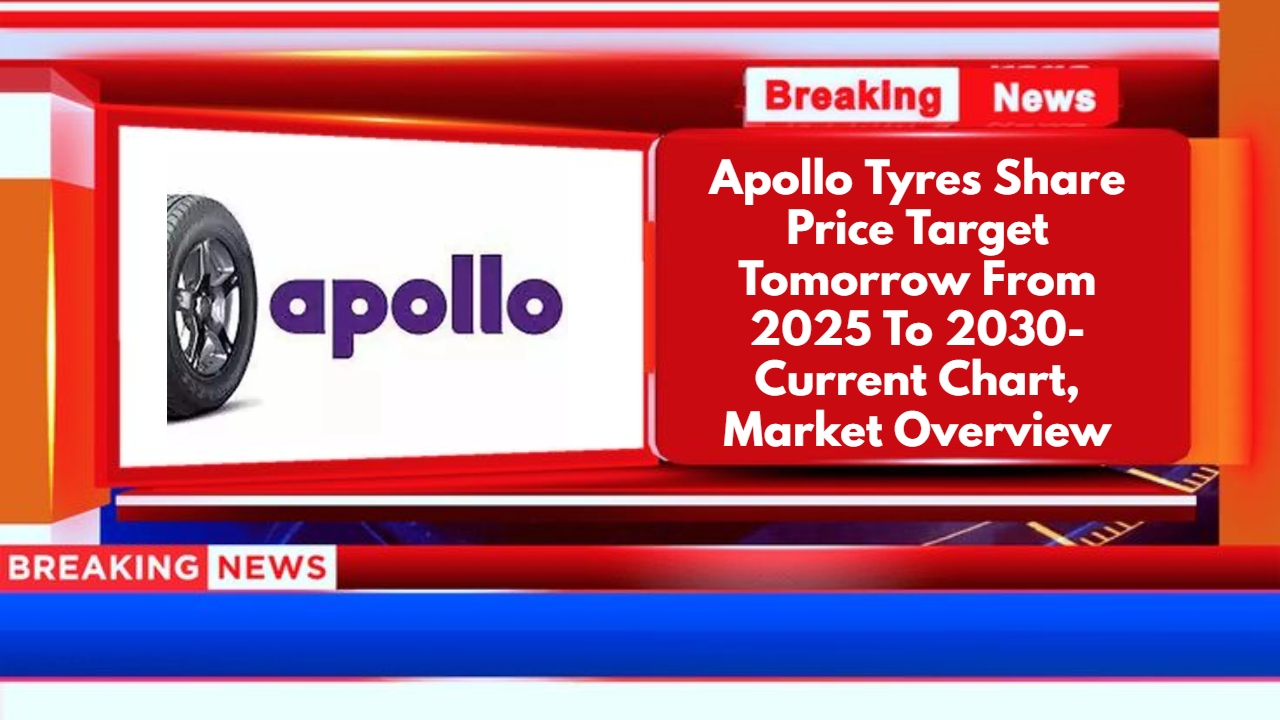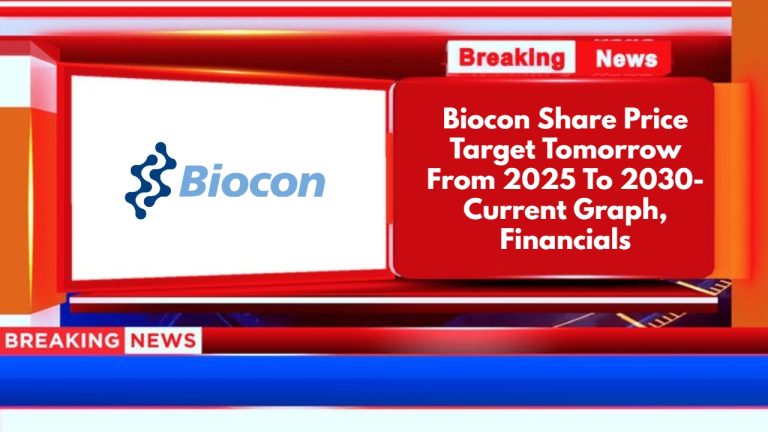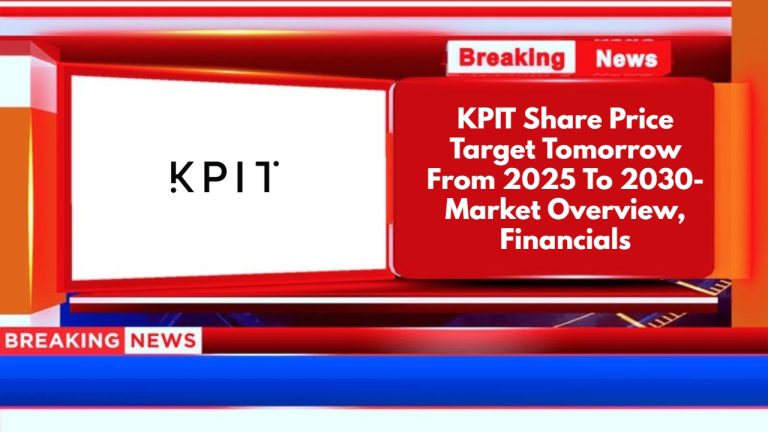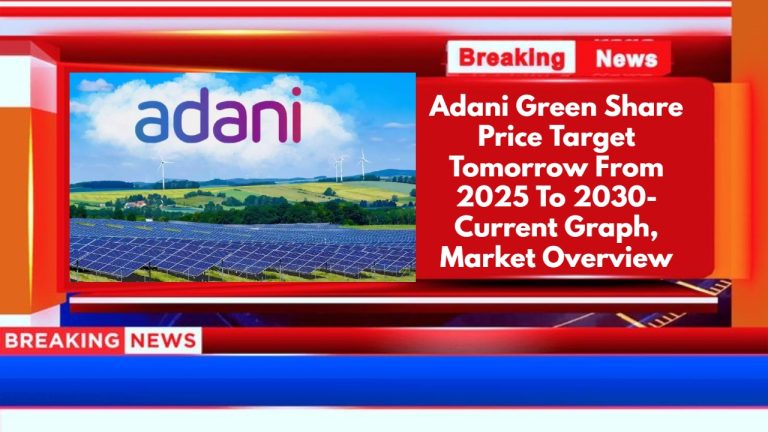Apollo Tyres Share Price Target Tomorrow From 2025 To 2030- Current Chart, Market Overview
Apollo Tyres is a trusted name in the tyre industry, known for offering strong, reliable, and high-quality tyres for all types of vehicles. Over the years, the company has built a strong reputation by focusing on customer needs and comfort. Many users are happy with Apollo Tyres because of their long-lasting performance, smooth driving experience, and value for money. Apollo Tyres Share Price on NSE as of 02 June 2025 is 470.50 INR. This article will provide more details on Apollo Tyres Share Price Target 2025, 2026 to 2030.
Apollo Tyres Ltd: Company Info
- Founded: 1972
- Headquarters: Gurugram
- Number of employees: 7,559 (2024)
- Revenue: 25,531.28 crores INR (US$3.2 billion, 2024)
- Subsidiaries: Apollo Vredestein, reifencom.
Apollo Tyres Share Price Chart

Apollo Tyres Share: Market Overview
- Open: 481.95
- High: 483.55
- Low: 465.70
- Mkt cap: 29.88KCr
- P/E ratio: 26.64
- Div yield: N/A
- 52-wk high: 584.90
- 52-wk low: 370.90
Apollo Tyres Share Price Target Tomorrow From 2025 To 2030
Here are the estimated share prices of Apollo Tyres for the upcoming years, based solely on market valuation, enterprise trends and professional predictions.
- 2025 – ₹590
- 2026 – ₹630
- 2027 – ₹670
- 2028 – ₹710
- 2029 – ₹750
- 2030 – ₹790
Apollo Tyres Share Price Target 2025
Apollo Tyres share price target 2025 Expected target could be between ₹580 to ₹590. Here are seven key factors influencing the growth of Apollo Tyres’ share price target for 2025:
-
Ambitious Revenue Targets
Apollo Tyres aims to achieve a revenue of $5 billion by FY26, up from its current $3.4 billion. The company is focusing on expanding its market share across various categories, particularly in Europe, and monitoring customer satisfaction scores to drive growth. -
Strategic Expansion in the U.S. Market
The company is aggressively expanding in the U.S., aiming to increase sales from $120–130 million to $500 million. This growth is supported by building sales and distribution networks and strengthening its brand presence. -
Focus on Electric Vehicle (EV) Tyres
Apollo Tyres is developing EV-specific tyres, such as the Apollo Amperion for electric cars and Apollo WAV for high-powered electric scooters. This aligns with the growing demand for EVs in India and Europe. -
Expansion in European Truck and Bus Radial (TBR) Market
The company has announced a five-year plan to build its presence in Europe’s TBR tyre market, including doubling production output at its Hungary plant and expanding its product range to cover up to 90% of the TBR segment’s size and specification requirements by 2025. -
Digital Transformation and E-commerce Growth
Apollo Tyres is embracing the digital revolution by enhancing its e-commerce platforms, offering consumers the convenience of online tyre shopping with options like “buy online, fit offline.” This approach empowers consumers with greater choice and control over their tyre buying experience. -
Commitment to Sustainability
The company is investing in research and development focused on sustainable materials and energy-efficient production processes. Apollo Tyres is also exploring solutions for recycling and repurposing old tyres, demonstrating a commitment to environmental responsibility. -
Strong Financial Performance and Analyst Confidence
Apollo Tyres has shown robust growth driven by strong demand across its diverse product range and strategic geographic expansion. Analysts forecast earnings growth of 21.9% per annum, with revenue expected to grow by 6% annually, indicating positive investor sentiment.
Apollo Tyres Share Price Target 2030
Apollo Tyres share price target 2030 Expected target could be between ₹780 to ₹790. Here are seven key risks and challenges that could impact Apollo Tyres’ share price target by 2030:
-
Intense Industry Competition
Apollo Tyres holds approximately 10.5% of the Indian market share. However, the tyre manufacturing industry is highly competitive, with major players like Michelin, Bridgestone, and Goodyear. This exposes Apollo Tyres to aggressive pricing strategies and product innovations from competitors, potentially affecting its market position. -
Rising Raw Material Costs
The company has faced significant increases in raw material costs, leading to a decline in its consolidated EBITDA margin by 480 basis points year-on-year to 13.6% during Q2 FY25. This shortfall highlights challenges in cost management and operational efficiency, which could impact profitability if not addressed. -
Regulatory and Legal Challenges
In April 2022, the Competition Commission of India fined Apollo Tyres ₹425.53 crore for alleged cartelization practices. Such regulatory actions can lead to financial penalties and damage the company’s reputation, affecting investor confidence. -
Sustainability and Environmental Compliance
Apollo Tyres aims to increase the usage of sustainable raw materials to 40% by 2030 and achieve carbon neutrality by 2050. While these goals are commendable, the high initial costs of production and variability in performance metrics compared to traditional tyres present challenges that could affect the company’s financial performance. -
Technological Disruptions
The rapid evolution of electric vehicles (EVs) requires continuous innovation in tyre technology. Apollo Tyres must invest in research and development to create EV-specific tyres, and any lag in this area could result in lost market opportunities and affect competitiveness. -
Global Economic Uncertainties
Economic downturns, inflation, and currency fluctuations can impact consumer spending and the automotive industry’s growth. Such macroeconomic factors may lead to reduced demand for tyres, affecting Apollo Tyres’ sales and profitability. -
Operational Challenges in International Markets
Expanding into international markets like the U.S. and Europe introduces complexities such as supply chain management, compliance with local regulations, and cultural differences. These challenges can affect the company’s ability to establish a strong foothold and achieve desired growth in these regions.
Shareholding Pattern For Apollo Tyres Share
| Held By | Mar 2025 |
| Promoters | 37.36% |
| Flls | 13.43% |
| Dlls | 26.51% |
| Public | 22.7% |
Apollo Tyres Financials
| (INR) | Mar 2025 | Y/Y change |
| Revenue | 261.23B | 4.41% |
| Operating expense | 93.56B | 17.77% |
| Net income | 11.21B | -34.88% |
| Net profit margin | 4.29 | -37.65% |
| Earnings per share | 10.44 | -44.84% |
| EBITDA | 35.72B | -12.12% |
| Effective tax rate | 27.50% | — |
Read Also:- KPIT Share Price Target Tomorrow From 2025 To 2030- Market Overview, Financials







